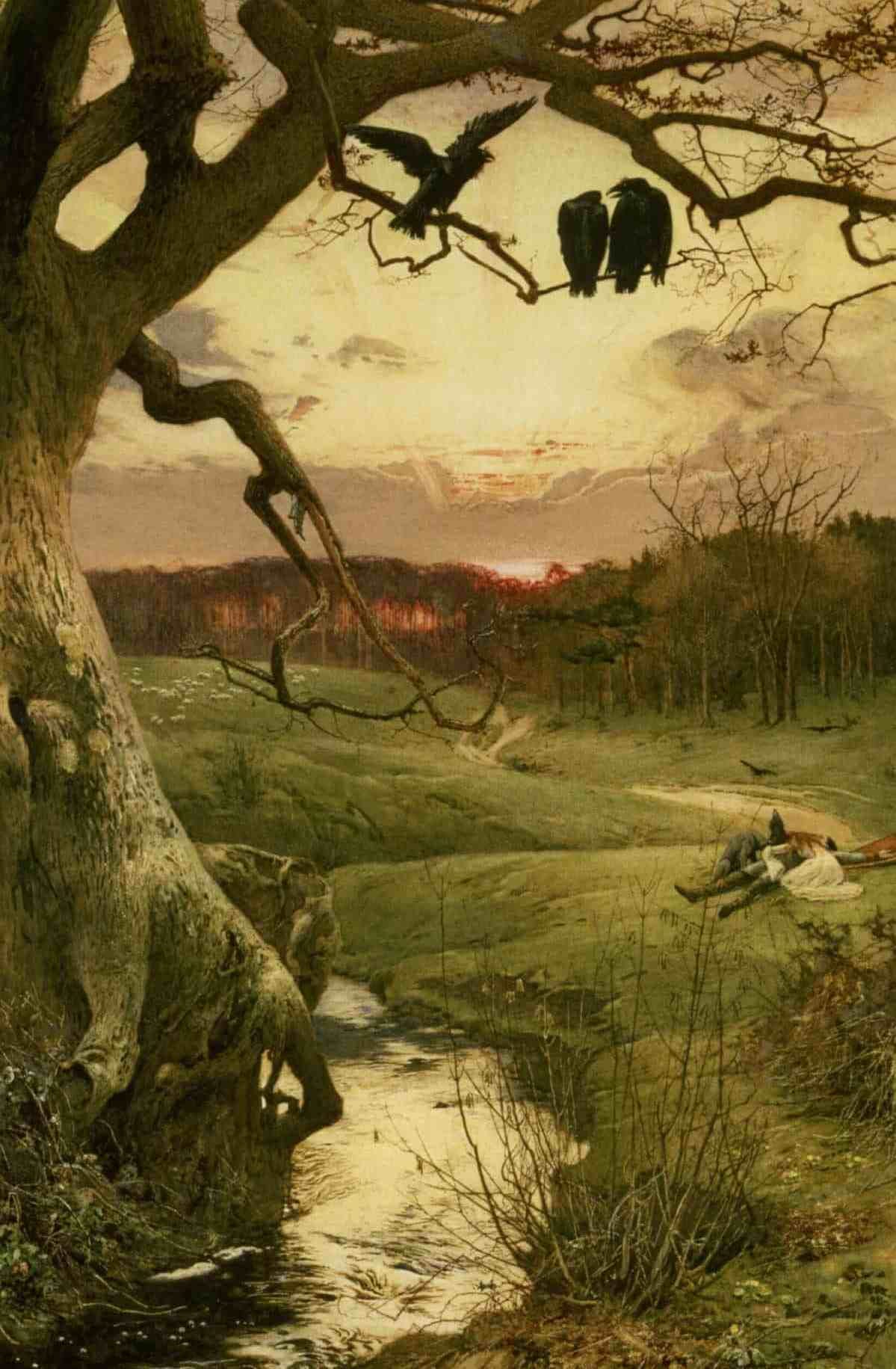The Three Ravens is an old English folk ballad which was first published in 1611, though it may in fact be much older than that. It is sung from the perspective of three ravens who are discussing where they shall find their next meal. One of those ravens mentions a knight whom he has found dead, though his body was being guarded by his loyal hawks and faithful hounds. Finally, to their great dismay, the knight’s pregnant leman (archaic for sweetheart or mistress) comes to tend to her lover’s corpse, that she might bury him with dignity.
I’ve included the text of the ballad at the end of this narrative for your enjoyment.
By contrast though, there exists a Scottish variant entitled The Twa Corbies, which is much more cynical and nihilistic by nature. Rather than paying any heed to the loyalties that the dead knight had won in life, it tells of the knight’s hounds and hawk who have forsaken their master, and of his mistress who has already taken another lover. It seems that nobody knows where the knight lies, or even cares. The ravens are therefore able to feast upon the knight’s corpse, undisturbed. The Twa Corbies actually illustrates this feast in gruesome detail. As the outlaw Josey Wales once put it, “buzzards gotta eat, same as worms.”
Perhaps the intent of this Scotch variant was to mock the goodness of an English knight — just perhaps. But since the closing moral of The Three Ravens is that every gentleman should be blessed with those who would care for him, even unto death, then the variant would seem to be alluding that this dead knight was no such gentleman!
If we can accept The Twa Corbies as a companion piece to The Three Ravens, it helps to amplify a Biblical theme worthy of our meditation.
In the book of Ecclesiastes, King Solomon philosophizes on the nature of man, how both the good and the wicked both end up in the ground. Like the unknown author of The Twa Corbies, Solomon seems to take a nihilistic tone with the subject of life; “All is vanity!” he proclaims from the book’s introduction through to its end. But strikingly, his conclusion is not to simply have a blast while you last — far from it! Rather, Solomon concludes that the only thing worth doing is living a Godly life, even if its hard.
Now all has been heard;
here is the conclusion of the matter:
Fear God and keep his commandments,
for this is the duty of all mankind.
For God will bring every deed into judgment,
including every hidden thing,
whether it is good or evil.
— Ecclesiastes 12:13-14
In the case of The Three Ravens, we are shown the fruits of a good man’s labour under the sun; that those whom he leaves behind would reciprocate the love and uprightness which he had showcased in life.
The Three Ravens
There were three rauens sat on a tree, downe a downe, hay downe, hay downe, There were three rauens sat on a tree, with a downe, There were three rauens sat on a tree, They were as blacke as they might be. With a downe, derrie, derrie, derrie, downe, downe. The one of them said to his mate, Where shall we our breakfast take? Downe in yonder greene field, There lies a Knight slain under his shield, His hounds they lie downe at his feete, So well they can their Master keepe, His Hawkes they flie so eagerly, There's no fowle dare him come nie Downe there comes a fallow Doe, As great with yong as she might goe, She lift up his bloudy head, And kist his wounds that were so red, She got him up upon her backe, And carried him to earthen lake, She buried him before the prime, She was dead her self ere euen-song time. God send euery gentleman, Such haukes, such hounds, and such a Leman.




